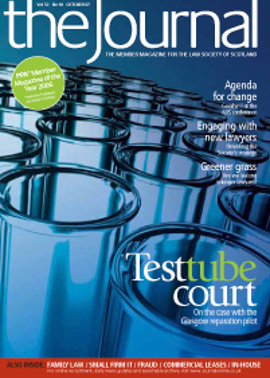Your voice will count

As you will probably know, I come to the position of President – and therefore write this column – sooner than you or I might have expected.
I want both to thank John MacKinnon for his help in enabling me to make the transition and to wish him well as he refocuses on the demands of practice.
I take up the job in a period of considerable change for the profession. However, regardless of the drivers for change, the Society’s ambition remains constant: we want a profession that is confident in its ability, and its place in, and contribution to, civic Scotland. The impression I have from conversations around the country is that there is real willingness to embrace change. And my discussions with international contacts suggest we are doing the right thing in trying to get ahead of the game where the need for change is pressing.
Agenda for change
The Society has certainly embraced responsibility for driving forward a positive agenda. Reform of the legal services market and the debate over alternative business structures may have arisen south of the border – first with the Clementi review and, more recently, the Legal Services Bill – but the Society contributed extensively to the Research Working Group on the Legal Services Market in Scotland, and has been keen to take forward that work. It now has the opportunity to do so.
If attendance was any measure of success, “The Public Interest – Delivering Scottish Legal Services” conference at the end of last month was outstanding. It also suggests the profession wants to be involved in this debate and in building the future. As I write this piece, a discussion paper is being prepared, taking into account views and feedback from the conference and setting out some of the options for the change. I hope that the paper will be issued for consultation at the end of October and trust it will continue to generate debate.
Standards redefined
The Society is also in the middle of a process to address standards of service and conduct. We think that the profession will benefit immeasurably from a clearer and more understandable statement of such standards. Again such an exercise has been under discussion for some time, though it was given added impetus with the decision to set up the Scottish Legal Complaints Commission. We will soon launch a wide-ranging consultation exercise on this too – details are contained on p 23 of this month’s Journal.
One innovative suggestion is that standards could differentiate between what is expected of individual practitioners and law firms as business entities. The Society is keen to ensure that we come up with a statement that meets the expectations of the profession and of clients and other relevant groups. To that end, we have formed a reference group of non-lawyers, including consumer interests, to test the draft statement as it is being prepared. I would encourage as many of you as possible to take part in the consultation. It is important that both solicitors and those with whom they come into contact should know what to expect from each other.
Underpinning core values
When we started the work on standards, we realised quickly that we would have to look at the profession’s core values. We are fortunate that the Society has already been examining the education and training regime for some time, with an in-depth consultation exercise conducted last year. Core values and principles lie at the heart of that exercise. The results have been assessed and we are now preparing a policy document for publication in early 2008. Training the next generation of lawyers to meet the needs of tomorrow’s legal services market and of the country at large is amongst our most important duties.
All of these projects are part of the drive by the Society to redefine its role and meet its responsibilities. The Strategy Project that Ruthven Gemmell and John MacKinnon put in place has a vital role in reinvigorating the profession and the Society. I am confident that its work can set the pattern for development for the next decade.
Bread and butter issue
So those are some of the challenges we are addressing: ABSs, standards, education, governance and strategic aims. But they pale into insignificance when seen against the research on civil legal aid published by the Society last month. The prospect of large numbers of practitioners withdrawing from legal aid work is a cause of real concern, not least because the most vulnerable in society may be denied adequate access to justice as a result. The views of legal aid practitioners must be heeded by all concerned, including the Society. We have to focus on resolving such problems, which will define the future as much as ABSs and other high-profile issues.
In this issue
- Advocacy in mediation
- Your voice will count
- Does justice need fixing?
- A case for trial?
- The tide for change
- New lawyers for all
- Leaving the profession
- Three proposals
- Options ahead on standards
- Know the need, know the cure
- The file at your fingertips
- Fraud: making your strategy work
- A wider view
- Pub games reborn
- Working with OSCR
- Goal to Leeds
- "We're all doomed" - or are we?
- Website reviews
- Book reviews
- Out of my depth?
- Court bars in-house privilege
- Leases: the war is over?
- ARTL picks up speed






